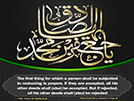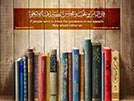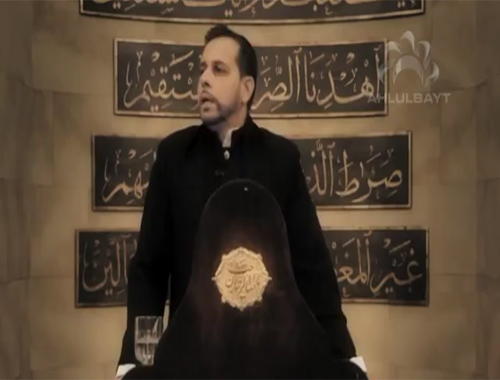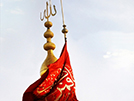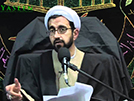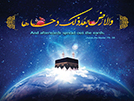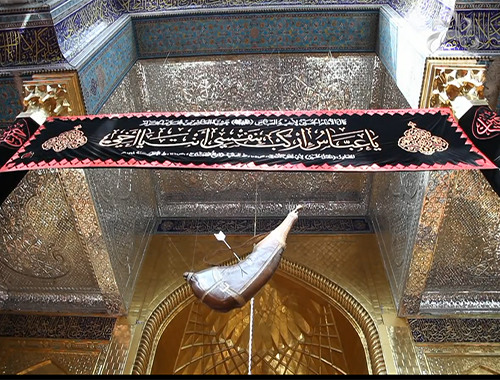Tawaf Conditions
- Details
- Hits: 3117
TawÄf Conditions
First: Intention
Second: Being pure from ḥadath (anything that breaks the state of ritual purity)
Third: Being pure from khabath (najis thing on ones body or cloths)
Fourth: Circumcision, for men
Fifth: Covering one's private parts
Sixth: Clothes worn in tawaf not being urusped.
Seventh: MuwÄlÄt (to consinue with tawaf without a big interruption)
First: Intention
That is deciding to perform tawÄf for ‘umrah or hajj with the intention of getting close to Allah the Sublime. TawÄf would not be valid without this intention even a little distance of the round i.e. any distance of the round walked without intention is not valid.
Issue 240. Closeness and sincerity to Allah the Sublime is a condition in intention i.e. one should perform the practice in the intention of obeying Allah’s commands; otherwise if he does it with dissimulation, he would disobey and his act would be void.
Issue 241. It is a condition in intention to demonstrate that the tawÄf is for ‘umrah al-mufradah, ‘umrah of tamattu‘, Hajjah al-Islam, hajj al-nadhrÄ« or mustahÌ£abb hajj. Also if one is nÄ’ib in this hajj, he must make the intention accordingly.
Issue 242. Verbal pronunciation of the intention or keeping it in mind is not conditioned. It is sufficient to do tawaf of `umrah obeying Allah's command. It is also advisable that while walking around ka`bah in tawaf one keeps saying dhikr, be submissive, has full concentration and reads the particular supplications mentioned for tawaf.
Second: Being ritually pure of the minor and major hÌ£adaths (minor hÌ£adath is that which needs wuḍū’ to be removed while major one is that which could not be removed without ghusl).
Issue 243. During an obligatory tawÄf, one should be pure from janabah, menes and nifas (puerperium). Moreover, wudu' is also mandatory for performing tawaf.
Explanation: An obligatory tawaf is that one which is a part of `umrah or hajj. Thus, a tawaf of a mustahabb `umrah or hajj is also obligatory.
Issue 244. If one with major or minor hÌ£adath had performed the tawÄf, his tawÄf would not be correct, no matter whether he was ignorant or forgetful. More than that he must repeat his tawÄf and its prayer even if he did not notice the problem but after completing the practices of ‘umrah or hajj.
Issue 245. Being with wudu' is not a condition for mustahabb tawaf. However, tawaf in a state of janabah or during period or nifas is, by obligatory caution, wad`an* incorrect. Adding to that it is taklifan* haram for the junub people or women in period or nifas to enter Masjid al-Haram.
Explanation: A mustahabb tawaf is the one doen separately from `umrah or hajj practices whether for oneself or on other's behalf. It is one of the mustahabb acts in Mecca and it is advisable to do ti as much as possible because it is so good and brings reward.
Issue 246. If the minor hÌ£adath occurs during tawÄf, then the following issues would be applied:
1- If the hÌ£adath occurs before reaching the middle of the fourth round (i.e. before the third corner of the Ka‘bah), one must discontinue the tawÄf and repeat it again after getting ritually pure.
2- When hÌ£adath occurs after the middle and before the end of the fourth round, one should discontinue the tawÄf and complete it after getting pure unless it would destroy the muwÄlÄt as per the common view, in case of which he / she should repeat it with the intention of completing the defective tawÄf as well as making a new, complete one. Also one could neglect it all and repeat it again from the beginning.
3- When the hÌ£adath occurs after completing the fourth round, one must discontinue the tawÄf, take wudu' and complete it after that, unless it would destroy the muwÄlÄt as per the common view; otherwise and according to caution, it is better to complete it then repeat it again. More than that one could, also, neglect the previous tawÄf to perform a new one, or to perform seven rounds with the intention of completing the defective tawaf as well as making a new, complete one.
Issue 247. If the major hÌ£adath occurs during tawÄf, one should leave the Masjid al-HÌ£arÄm immediately. If this happens before reaching the middle of the fourth round, one's tawÄf would be void and it must be repeated after taking ghusl. While if it occurrs after that point and before completing the fourth round, one should continue the tawÄf after ghusl unless muwÄlÄt would be destroyed according to the common view; otherwise and according to caution, one has to complete it and repeat it again. One can also perform a full tawÄf with the intention of completing the defective tawaf as well as making a complete, new one or neglect the previous rounds to start a new tawÄf after making ghusl. While if it happens after the end of the fourth round, then its rule would be just like that of the minor hÌ£adath mentioned before.
Issue 248. One who is excused from doing wuḍū’ or ghusl, must do tayammum instead.
Issue 249. If a pilgrim, who cannot do wudu' or ghusl for an excuse, knows that his / her excuse will be removed at the end of the time (like the ill person who knows that his / her illness will be cured), he / she must wait until excused is removed to perform tawaf with wudu' or ghusl. Moreover, if one hopes that one's excuse will no more exist, it is an obligatory caution hat he / she should wait until time becomes short or until disappearance of the excuse becomes hopeless. At that time one should do tayammum and perform tawaf.
Issue 250. One, whose duty is tayammum or wuḍū’ of jabirah and he / she performs tawÄf and its prayer without getting pure by them due to ignorance about the rule, is obliged to repeat them by himself / herself if one can; otherwise one should send a na'ib to do that on one's behalf.
Issue 251. If a woman's period starts after she had done ihÌ£rÄm for ‘umrah al-mufradah and she could not wait to complete her rites after getting pure and taking ghusl, she is then obliged to have someone else to perform tawÄf and its prayer on her behalf, while with respect to sa‘y and taqsÄ«r, she must perform them by herself. In this way she can be released from ihÌ£rÄm. The rule is just the same if she had done ihÌ£rÄm while she was in her period. But if she enters ihram while in the period for `umrah al-tamattu` or her period starts after entering ihram and she cannto wait for the period to stop to take ghusl and do tawaf and its prayer, another ruling applies to her which has been already mentioned.
Issue 252. Among the practices of `umrah, only the tawaf and its prayer required purity from hadath. The other `umrah practices do not need purity even though it is preferred to be always pure from hadath.
Issue 253. If one doubts about his / her state of purity, one must act as follows:
1- If before commencing tawaf they fall in doubt about their wudu', one they have to do wudu'.
2- If ghusl was already obligatory for them and before starting tawaf they doubt if they have done it or not, they must do it.
3- If they were already in a state of wudu' and fall in doubt as to whether it has become void or not, doing new wudu' is not needed.
4- If they are pure but they doubt if they have become junub or not or a woman doubts if her period has started or not, no ghusl is required.
5- If they fall in doubt about their purity after had completed tawaf, their tawaf is correct but they should get pure for its prayer.
6- If they start tawaf with purity but during it fall in doubt as to whether a hadath happens or not — like if they fall in doubt as to whether their wudu' has been invalidated or not —, they would not pay attention to this dobut and assume purity.
7- If, during tawÄf, they fall in doubt as to whether they had started with purity or not, then if their previous state was that of purity, they should consider it so and disregard their doubt and tawaf is valid. But, if theyw ere not previously with wudu' or doubt their previous state, they must do wudu' and repeat the tawÄf from the beginning.
8- If they were obliged to do ghusl and, during tawaf, they fall in doubt if they had done it or not, they must immediately leave the masjid, do gusl and start the tawaf from the beginning.
Third: Purity of the body and the cloths of khabath.
Issue 254. During tawaf, one's body and the clothes should be pure of any blood. By obligatory caution, they should be pure of other najasahs, as well. However, purity is not a condition in things like socks, handkerchief and ring.
Issue 255. As the blood spot whose area is lesser than a dirham or blood of wounds does not invalidate prayer, it also does not make tawaf void.
Issue 256. If one's body is najis and they can delay tawaf to purify it, they should delay it unless time becomes so short.
Issue 257. If one doubts as to whether his / her body or the dresses are najis or not, he / she is allowed to do tawaf with them and it is valid. But, if he / she knows that they were najis and does not know whether he / she has purified them or not, he / she is not allwoed to do tawaf with them.
Issue 258. If, after completing tawaf, one finds that his / her body or the clothes are najis, his / her tawaf is ruled correct.
Issue 259. If one's body or the clothes become najis during tawaf, e.g. if one's foot is injured in the crowd and purifying them is not possible but after cutting the tawaf, one must discontinue tawÄf, leave to purify one's body or cloths and return immediately to complete tawÄf from the point of discontinuation and it will be correct.
Issue 260. If during tawaf one find his / her body or the clothes are polluted with najasah but he / she does not know if pollution happened before or duing tawaf, the ruling will be the same as the previous issue.
Issue 261. In case one become aware of the najasah of one's body or the dresses during tawaf and he / she is sure of its presence before starting tawaf, one should follow the rule mentioned above.
Issue 262. One who forgets the najÄsah on his / her body or cloths and becomes aware of it during tawÄf, he / she must follow the rule mentioned for the above three issues.
Issue 263. If one forgets najasah on his / her body or clothes, does tawaf like that and only remembers it after completing tawaf, one's tawaf is correct. But, if he / she offers the prayer of tawaf with the mentioned najasah, he / she has to repet it after purification. As for this issue, it is a caution to repeat tawaf again after getting pure.
Fourth: Circumcision.
Circumcision is a condition for the tawÄf of men, not women, to be correct. TawÄf of the uncircumcised is void whether he is legally mature (baligh) or a child.
Fifth: Covering of one's private parts.
Issue 264. For tawÄf to be correct, it is a condition to cover the private parts according to obligatory caution.
Issue 265. If, during tawÄf, a woman had not covered all of her hair or she had uncovered a part of her body, her tawÄf would be correct, although she would have committed a prohibited act.
Sixth: clothes worn in tawaf not being usurped
Issue 266. For tawaf to be correct, it is a condition that one's clothes should not be usuped. Then, if one does tawaf with usurped clothes, his / her tawaf is, by obligatory caution void.
Seventh: Muwalat
Issue 267. It is based on obligatory caution that conventional muwÄlÄt between the parts of the tawÄf is a condition. In other words, tawaf shold not be interrupted so that it is not counted as a single tawaf any longer. To be excluded from this is the discontinuation of tawÄf after passing its first half (i.e. 3.5 rounds) for offering prayer or something like that.
Issue 268. One who discontinues oen's obligatory tawÄf to offer an obligatory prayer, then if this was after completing the first half, he / she would continue it later from the point of discontinuation. But, if it was before that, then if a long gap had lapsed, observing caution would necessitate repeating the tawÄf; otherwise it is not remote that this caution is not obligatory, although, however, caution is better. In this issue there is no difference whether the prayer was individually performed or in congregation or whether the time was limited or sufficient.
Issue 269. It is permissible to discontinue mustahÌ£abb tawÄf and the obligatory, as well, although, according to caution, it is better not to discontinue the obligatory one in such a way that the muwÄlÄt accepted by the common view would be destroyed.

